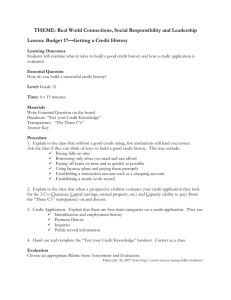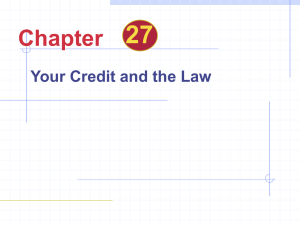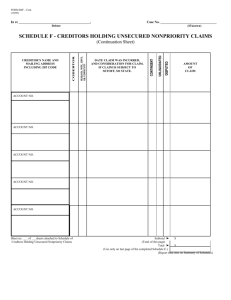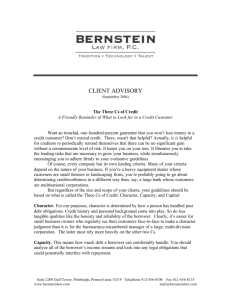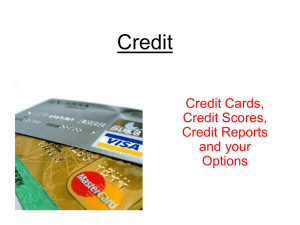Fact Sheet 6 Plan to Pay Creditors and Protect Family Welfare
advertisement
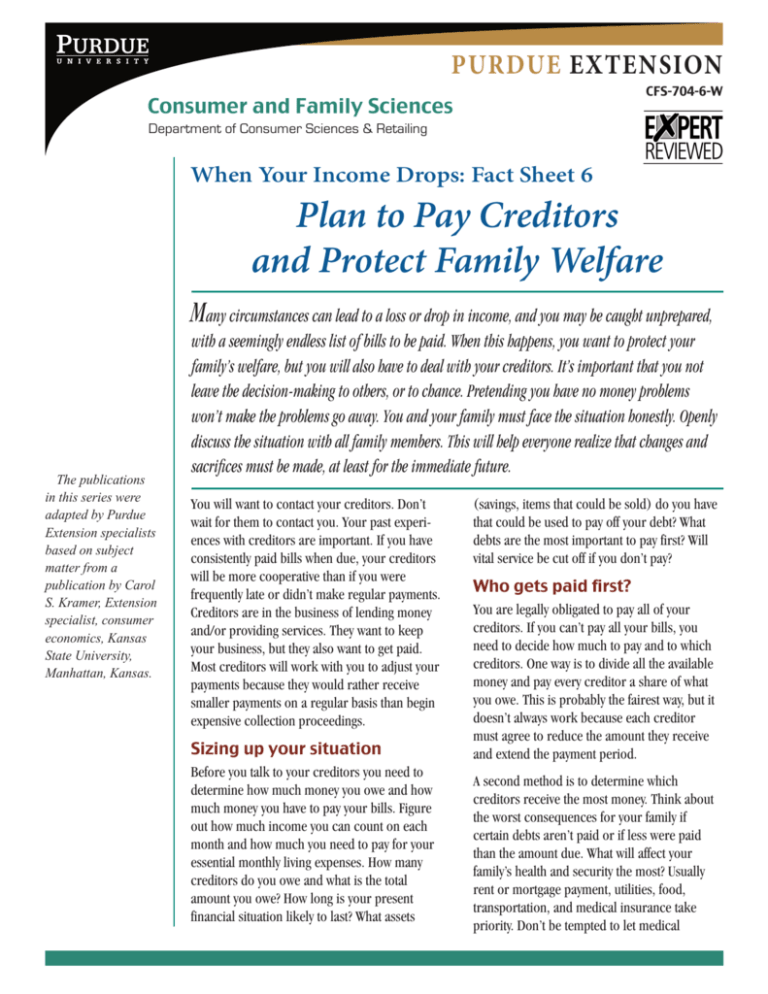
Purdue Extension CFS-704-6-W Consumer and Family Sciences Department of Consumer Sciences & Retailing When Your Income Drops: Fact Sheet 6 Plan to Pay Creditors and Protect Family Welfare Many circumstances can lead to a loss or drop in income, and you may be caught unprepared, The publications in this series were adapted by Purdue Extension specialists based on subject matter from a publication by Carol S. Kramer, Extension specialist, consumer economics, Kansas State University, Manhattan, Kansas. with a seemingly endless list of bills to be paid. When this happens, you want to protect your family’s welfare, but you will also have to deal with your creditors. It’s important that you not leave the decision-making to others, or to chance. Pretending you have no money problems won’t make the problems go away. You and your family must face the situation honestly. Openly discuss the situation with all family members. This will help everyone realize that changes and sacrifices must be made, at least for the immediate future. You will want to contact your creditors. Don’t wait for them to contact you. Your past experiences with creditors are important. If you have consistently paid bills when due, your creditors will be more cooperative than if you were frequently late or didn’t make regular payments. Creditors are in the business of lending money and/or providing services. They want to keep your business, but they also want to get paid. Most creditors will work with you to adjust your payments because they would rather receive smaller payments on a regular basis than begin expensive collection proceedings. Sizing up your situation Before you talk to your creditors you need to determine how much money you owe and how much money you have to pay your bills. Figure out how much income you can count on each month and how much you need to pay for your essential monthly living expenses. How many creditors do you owe and what is the total amount you owe? How long is your present financial situation likely to last? What assets (savings, items that could be sold) do you have that could be used to pay off your debt? What debts are the most important to pay first? Will vital service be cut off if you don’t pay? Who gets paid first? You are legally obligated to pay all of your creditors. If you can’t pay all your bills, you need to decide how much to pay and to which creditors. One way is to divide all the available money and pay every creditor a share of what you owe. This is probably the fairest way, but it doesn’t always work because each creditor must agree to reduce the amount they receive and extend the payment period. A second method is to determine which creditors receive the most money. Think about the worst consequences for your family if certain debts aren’t paid or if less were paid than the amount due. What will affect your family’s health and security the most? Usually rent or mortgage payment, utilities, food, transportation, and medical insurance take priority. Don’t be tempted to let medical CFS-704-6-W insurance slide when money is tight. If anyone in your family becomes ill, uninsured medical costs could be devastating. You can lose your possessions if the creditor holds the title to the property as security for the loan. Sometimes furniture and large appliance loans are secured loans. If you aren’t sure which loans are secured, check the credit contract. Unsecured debts may have to take lower priority temporarily, although you are obligated to pay them, too. You can lose your possessions if the creditor holds the title to the property as security for the loan. Determine how much you have paid on each loan or contract and how much you owe. If you have only one or two payments to make on a loan, it’s probably a good idea to finish paying it, getting that debt out of the way. You may be able to return newer items or sell them to pay off the debt. If you choose to voluntarily surrender the item, you’ll still be required to pay the difference between the market value of the item and the amount remaining on the loan. But getting out from under some of your debts can reduce the pressure you feel. Credit card firms charging 1.5 percent interest per month would receive 18 percent interest per year on the unpaid balances. If you have a loan with a lower interest rate, you may decide to pay off the higher-interest credit card balance first, to reduce the amount of finance charges you are paying. “Power Pay” is a computer program that can assist you in determining different options and the costs associated with each option. It is available at no cost at https://powerpay.org. Until your financial situation improves, destroying your credit cards and closing your accounts may be a good idea. At least put the credit cards in a safe place so you are not tempted to use them. Deciding which bills to pay first Which debt should be repaid first? If you don’t have enough money to go around, debts should be paid back based on what will happen if you don’t pay your bills. Ask yourself these questions. • What is the “secured” status of the loan? If the loan was co-signed or secured by collateral, pay this back first. If you don’t, you may lose your property. Secured loans are made by pledging personal assets or by co-signing with another person. Unsecured loans are loans you get on the basis of your signature and good credit rating. • What legal action has been taken? If you do not want your wages garnisheed or the item repossessed, pay the debt back as soon as possible. • How much interest are you paying? How much money are you paying to borrow the money? Debts with the highest interest rate are costing you the most. • What will happen to you if you don’t pay the bill on time? a. Is there a “grace period” for paying before the creditor takes action to collect? b. Is there a penalty or charge for late payment? c. Will the remaining balance need to be paid in full if you miss a payment? d. Will the creditor harass you? e. Will you lose your possessions or assets? f. Will your utilities be disconnected or will you be evicted? • If you fail to repay a debt to a family member, will there be hard feelings? When there’s not enough money to pay everything, look at what will happen if you don’t immediately pay each debt. If the loan is secured, you stand to lose your collateral. Here are some examples of debts you want to pay back first: Mortgage Landlord Secured loans Insurance Utilities Auto loans Telephone 2 CFS-704-6-W Some examples of second priorities are credit cards and finance companies (if unsecured debts). Some examples of third priorities are doctors, dentists, and hospitals. Contacting your creditors Once you have calculated how much money your family has for monthly living expenses and for paying off debts, decide how much you can pay each creditor. Work out a repayment plan that shows how much you plan to pay each creditor. As you negotiate with each of your creditors, don’t agree to any plan simply to get off the hook. Establish a repayment plan that is acceptable to both you and the creditor. Now you are ready to contact each of your creditors to explain your situation and work out a solution. Be prepared to explain the reason you cannot pay, your current income and prospects for future income, your other obligations, your plans to bring this debt up-to-date, and the amount you will be able to pay each month. Visit local creditors in person. Visit the loan officer at your bank or credit union, the credit manager of local stores, and the billing office of your dentist, physician, clinic, or hospital. Some businesses, such as utility companies, have special counselors for customers who can’t pay their bills. These counselors can help you set up a budget plan to even out your payments during the year. They also tell you if you qualify for fuel assistance or any available programs. Contact out-of-town creditors by phone or letter. If you phone, write down the name and title of the person to whom you talked. Follow the conversation with a letter, spelling out the agreement between you and the creditor. Keep copies of your letters as well as any reply. As you negotiate with each of your creditors, don’t agree to any plan simply to get off the hook. Establish a repayment plan that is acceptable to both you and the creditor. If you fail to follow through on a plan that you and your creditor agree upon, the creditors will be less understanding. If you fail to make the payments, creditors may hire a collection agency to make you pay. Here are some alternatives to consider when negotiating with your creditors: • Reducing the monthly payment. • Refinancing the loan. • Deferring a payment for a short time if you expect your income will increase soon. • Reducing or dropping late charges. • Paying only interest on the loan until you can resume making monthly payments. • Voluntarily surrendering or giving back an item purchased on credit. • Selling the item and using the cash to pay or partially pay the debt (you are still responsible for any remaining balance). Not all creditors will be willing to accept alternatives. However, they’ll be more likely to work with you if you contact them before they contact you. If you owe a large amount of money, and if your creditors won’t accept reduced payments or a negotiated plan, you may consider taking a debt consolidation loan. You may even have to consider more extreme alternatives such as Chapter 13 bankruptcy, or as a final resort, Chapter 7 bankruptcy. Debt consolidation Debt consolidation loans are issued in Indiana by licensed banks, savings and loans, credit unions, and finance companies. You take out a cash loan to pay your creditors. Your new debt, then, is owed to the financial institution that makes the loan. This type of loan may be useful, under certain circumstances, when you are having trouble meeting current obligations. In some instances, you can use a home equity loan for debt consolidation. However, if you are unable to repay the loan, you lose your house. With a debt consolidation loan, your monthly loan payment is less than the total of individual debts you had before. You should be aware, though, that commercial debt consolidation and home equity loans cost money and almost always extend the life of your debts. Debt consolidation 3 CFS-704-6-W loans in Indiana are regulated under the Indiana Uniform Consumer Credit Code. The maximum annual percentage rate (APR) that can be charged on a debt consolidation loan is: Loan Amount Maximum APR $0-$1,020 36% $1,021-$3,400 21% $3,401 + 15% Financial institutions also have the option of charging a flat 21% annual percentage rate on consolidation loans. If you are considering a consolidation or home equity loan, contact several financial institutions and ask what annual percentage rate they would charge on a loan for the amount you need. Ask if there are any other finance charges associated with the loan. If you choose this route, be sure to shop around for the best terms. And don’t be fooled into thinking that a consolidation or home equity loan has solved your financial troubles. You will still need to exercise financial care until your income rises again. Chapter 7 bankruptcy is also called “voluntary” or “straight” bankruptcy. Under Chapter 7, when a petition is filed for bankruptcy, it must include a list of all assets and liabilities. The court can liquidate major assets with the exception of certain personal possessions. Chapter 7 bankruptcy theoretically wipes the financial slate clean. The potential stigma of taking bankruptcy should be carefully considered, however. Chapter 11 is especially for business bankruptcies. In most cases of bankruptcy, the advice of an attorney is desirable; in Chapter 11, the services of an attorney are vital. Bankruptcy information and regulations change regularly. Contact the United States Trustee Program for current information about the federal bankruptcy system. You can call (317) 226-6101 or (574) 236-8105 or go online to www.usdoj.gov/ust. Bankruptcy If your financial affairs have deteriorated beyond repair, bankruptcy is a last recourse. Bankruptcy laws were designed to release persons of insupportable debts and spare the individual undue harassment by creditors. While there are no hard-and-fast rules, bankruptcy might be a consideration if: 1) your creditors are unwilling to renegotiate debts, 2) you cannot obtain a consolidation loan, 3) no other source of help is available, 4) essential expenses do not exceed 75 percent of your take-home income (as in Chapter 13). “Bankruptcy” really includes three choices — Chapter 13, Chapter 7, and Chapter 11. Chapter 13 allows the debtor, acting through a bankruptcy trustee, to work out a whole or partial repayment plan, if creditors agree. Payments are made to the court, interest charges stop on the date of the filing, and the payment schedule stretches for a period of three to five years. 4 CFS-704-6-W The publications in this series 1) Don’t Panic – Take Control (CFS-704-1-W) www.ces.purdue.edu/extmedia/CFS/ CFS-704-1-W.pdf 2) Control Stress (CFS-704-2-W) www.ces.purdue.edu/extmedia/CFS/ CFS-704-2-W.pdf 3) Take Stock of Family Resources (CFS-704-3-W) www.ces.purdue.edu/ extmedia/CFS/CFS-704-3-W.pdf 4) Take Stock of Community Resources (CFS-704-4-W) www.ces.purdue.edu/ extmedia/CFS/CFS-704-4-W.pdf 5) Set Priorities for Spending (CFS-704-5-W) www.ces.purdue.edu/extmedia/CFS/ CFS-704-5-W.pdf 6) Plan to Pay Creditors and Protect Family Welfare (CFS-704-6-W) www.ces.purdue.edu/ extmedia/CFS/CFS-704-6-W.pdf 7) Keep a Roof Overhead (CFS-704-7-W) www.ces.purdue.edu/extmedia/CFS/ CFS-704-7-W.pdf 8) Meeting Insurance Needs (CFS-704-8-W) www.ces.purdue.edu/extmedia/CFS/ CFS-704-8-W.pdf 9) Sharpen Your Survival Skills (CFS-704-9-W) www.ces.purdue.edu/extmedia/CFS/ CFS-704-9-W.pdf Purdue ExtenSion Revised 01/08 It is the policy of the Purdue University Cooperative Extension Service that all persons have equal opportunity and access to its educational programs, services, activities, and facilities without regard to race, religion, color, sex, age, national origin or ancestry, marital status, parental status, sexual orientation, disability or status as a veteran. Purdue University is an Affirmative Action institution. This material may be available in alternative formats. Order or download materials at the Purdue Extension Education Store • www.ces.purdue.edu/new
